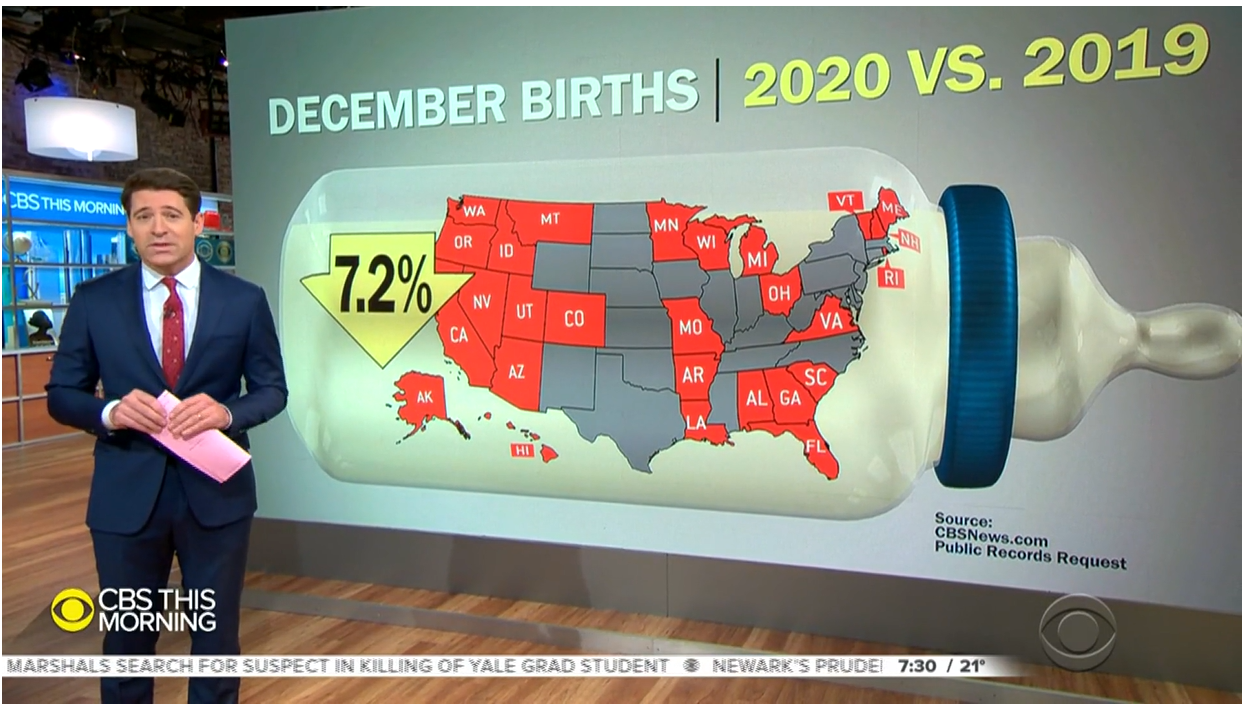Experts sound the alarm on declining birth rates among younger generations: “It’s a crisis”
New data is confirming a baby boom that some doctors expected was actually a “baby bust.” Health departments in more than two dozen states provided records to CBS News, showing a 7% drop in births in December — nine months after the first lockdowns began.
Researchers say it continues a much bigger plunge in fertility in recent decades.

The number of babies the average woman in the U.S. is expected to deliver has dropped from nearly four in the 1950s to less than two today.
The drop could present an entirely different risk to society than one that was first warned about decades ago — when an apocalyptic fear gripped America in the 1960s and 1970s.
“The stakes in this battle are far greater than any other we have ever fought,” Walter Cronkite said in a 1970 CBS News broadcast. “The experts we interviewed told us population was the fundamental crisis.”
As the world stampeded toward 10 billion people, many researchers back then predicted that overpopulation would ruin humanity.
Biologist Paul Ehrlich once explained the threat as “The Population Bomb,” the title of a book he authored in 1968.
“Sometime in the next 15 years, the end will come — and by the end, I mean an utter breakdown of the capacity of the planet to support humanity,” he said in a 1970 broadcast.
Today, however, a very different note is struck by researchers like University of Southern California Professor Dowell Myers, who studies demographic trends.
“The trouble is we overshot and we dropped it down too much now,” Myers told “CBS This Morning” co-host Tony Dokoupil.
While the global population is still growing, a major study published in The Lancet in 2020 predicted it would peak in 2064, and then fall by nearly a billion people by the end of the century — the reason being, fewer babies.
The U.S. is already below the so-called “replacement level” by some measures, meaning fewer young people to support the country’s otherwise aging population.
Myers said of the decline, “That’s a crisis.”
“We need to have enough working-age people to carry the load of these seniors, who deserve their retirement, they deserve all their entitlements, and they’re gonna live out another 30 years,” he said. “Nobody in the history of the globe has had so many older people to deal with.”
The coronavirus pandemic is also making the problem worse — despite what some people previously thought.
“We thought, oh, we would see a baby boom. But we just haven’t seen it,” said Dr. David Jaspan, chair of the Department of Gynecology and Obstetrics at Einstein Medical Center in Philadelphia.
The Brookings Institution has predicted “a large, lasting baby bust” of at least 300,000 fewer children in 2021.
For Laura Lindberg, who tracks reproductive data for the Guttmacher Institute, the decrease in births could be a sign of progress — a marker of women’s equality and freedom of choice.
“So it’s a shift to later in life. In that shift comes more education, more career, more employment. So it’s a reordering of how people engage in adulthood,” Lindberg explained.
Dowell Myers doesn’t disagree — but in the bigger picture, he worries the declining birth rate is also a “barometer of despair.”
Myers said he never expected to be talking about a global declining birth rate during his lifetime.
Asked what changed, he pointed to “the burdens of life.”
https://www.cbsnews.com/news/birth-rate-declining-younger-generations-crisis/
“The cost of housing, the cost of education, all these things have become more and more difficult,” Dowell said. “I think the boomers themselves don’t realize how much harder it is for millennials today. And they think, ‘Oh yeah, when we were young we had to live, you know, on very little money, and we made do, and you can do the same.’ That’s the story, right? Well no, it really is a lot harder for young people today. It’s amazing how much harder it is.”
Jaspan said patients are not only worried about their health, but their finances as well.
“I get a report every morning at 5:15 about what has happened in the last 24 hours. And the first report that I see is the number of deliveries in the last 24 hours,” Jaspan said. “It’s less than it used to be.”





